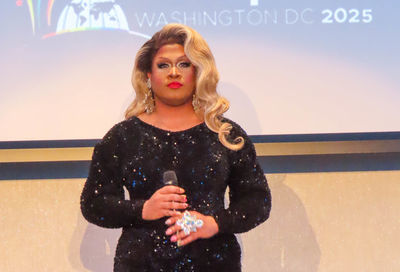Federal judge rules Florida same-sex marriage ban unconstitutional

A federal judge struck down Florida law prohibiting same-sex marriage in a ruling handed down Thursday, marking the latest in an unbroken string of federal court wins for marriage equality.
U.S. District Court Judge Robert Hinkle found Florida law banning same-sex marriage and blocking recognition of same-sex marriages performed in other states in violation of the Due Process and Equal Protection Clauses of the 14th Amendment to the U.S. Constitution.
The ruling comes in two combined cases with a total of 22 plaintiffs, including nine same-sex couples who were lawfully married in New York, D.C., Iowa, Massachusetts or Canada; the surviving spouse of a New York same-sex marriage; a same-sex couple of 15 years seeking to marry in Florida; and an organization asserting the rights of its members who lawfully entered same-sex marriages in other states.
“The founders of this nation said in the preamble to the United States Constitution that a goal was to secure the blessings of liberty to themselves and their posterity. Liberty has come more slowly for some than for others,” Hinkle wrote. “It was 1967, nearly two centuries after the Constitution was adopted, before the Supreme Court struck down state laws prohibiting interracial marriage, thus protecting the liberty of individuals whose chosen life partner was of a different race. Now, nearly 50 years later, the arguments supporting the ban on interracial marriage seem an obvious pretext for racism; it must be hard for those who were not then of age to understand just how sincerely those views were held. When observers look back 50 years from now, the arguments supporting Florida’s ban on same-sex marriage, though just as sincerely held, will again seem an obvious pretext for discrimination. Observers who are not now of age will wonder just how those views could have been held.”
Hinkle, who was nominated to the federal bench by President Bill Clinton in 1996, stayed his decision pending appeal. The stay will remain in effect until stays have been lifted in the three cases challenging same-sex marriages bans in Utah, Oklahoma and Virginia that the U.S. Supreme Court has been asked to hear and for an additional 90 days to “allow the defendants to seek a longer stay from this court or a stay from the Eleventh Circuit or Supreme Court.”
The stay will not apply to one of the plaintiffs — Arlene Goldberg. Goldberg married Carol Goldwasser, who died earlier this year, in New York in 2011.
“There is one exception to the stay,” Hinkle wrote. “The exception is the requirement to correct Ms. Goldwasser’s death certificate. The correction is important to Ms. Goldberg. There is little if any public interest on the other side of the scale. There is no good reason to further deny Ms. Goldberg the simple human dignity of being listed on her spouse’s death certificate. Indeed, the state’s refusal to let that happen is a poignant illustration of the controversy that brings us here.”
Thursday’s ruling marks the first federal court ruling to find Florida’s same-sex marriage ban unconstitutional and comes after three state judges have struck down the ban. On Aug. 4, Circuit Court Judge Dale Cohen found that Florida law prohibiting same-sex marriage and the recognition of legal same-sex marriages performed in other states violates the Due Process and Equal Protection Clauses of the U.S. Constitution. in a decision that applied only to Broward County. On July 25, Circuit Court Judge Sarah Zabel struck down the Florida ban in a ruling that applied only to Miami-Dade County. And on July 17, Chief Circuit Judge Luis Garcia reached a similar conclusion in a ruling that applies only to Monroe County. All three judges stayed their decisions pending appeal.
Since the Supreme Court struck down Section 3 of the Defense of Marriage Act in June 2013, federal courts have ruled in favor of marriage equality in Utah, Ohio, Oklahoma, Kentucky, Idaho, Illinois, Indiana, Michigan, Pennsylvania, Tennessee, Texas, Virginia, Oregon, Wisconsin, Indiana and Colorado.
“The institution of marriage survived when bans on interracial marriage were struck down, and the institution will survive when bans on same-sex marriage are struck down,” Hinkle wrote. “Liberty, tolerance, and respect are not zero-sum concepts. Those who enter opposite-sex marriages are harmed not at all when others, including these plaintiffs, are given the liberty to choose their own life partners and are shown the respect that comes with formal marriage. Tolerating views with which one disagrees is a hallmark of civilized society.”
Support Metro Weekly’s Journalism
These are challenging times for news organizations. And yet it’s crucial we stay active and provide vital resources and information to both our local readers and the world. So won’t you please take a moment and consider supporting Metro Weekly with a membership? For as little as $5 a month, you can help ensure Metro Weekly magazine and MetroWeekly.com remain free, viable resources as we provide the best, most diverse, culturally-resonant LGBTQ coverage in both the D.C. region and around the world. Memberships come with exclusive perks and discounts, your own personal digital delivery of each week’s magazine (and an archive), access to our Member's Lounge when it launches this fall, and exclusive members-only items like Metro Weekly Membership Mugs and Tote Bags! Check out all our membership levels here and please join us today!





















You must be logged in to post a comment.